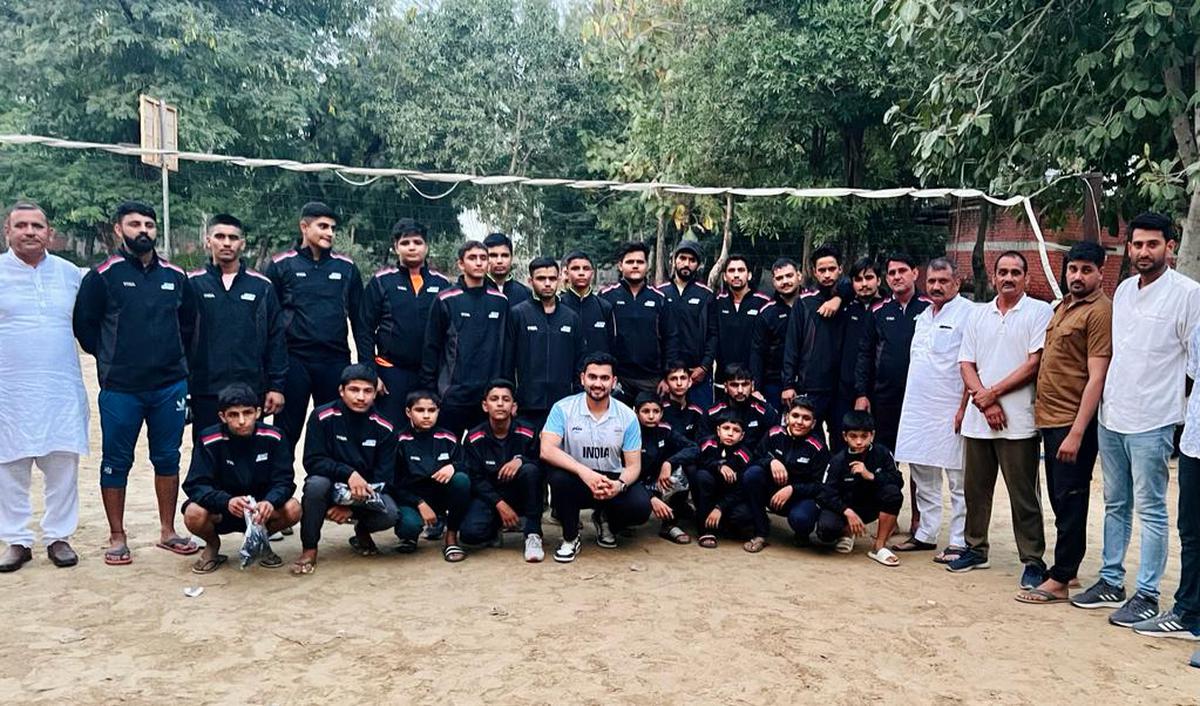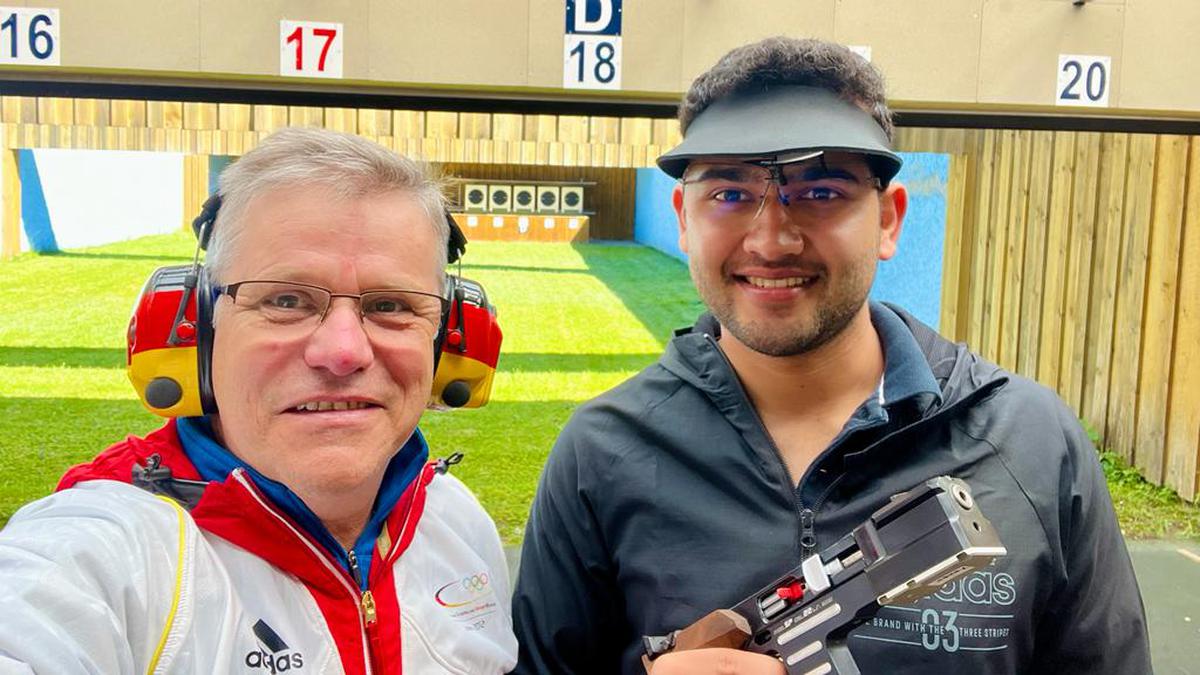With World Cup final bronze under his belt and Paris Olympics looming, Anish Bhanwala believes he’s closer to shooting bullseye
With three-time Olympic champion Ralf Schumann in his corner, Anish Bhanwala has enjoyed the most successful senior season of his career. His next target is the Olympics.
When he fired his final shot of the sixth series in the final of the men’s 25m rapid fire pistol event at the World Cup finals on Friday night, Anish thought his competition was over. With just two hits out of five, he had shot his worst round of the international season-ending competition in Doha. In fourth place at the start of the series, he had only scored 23 (out of a possible 30) after his round.
Matej Rampula of the Czech Republic was next up. He had started the round on 22 (out of 25) and needed one to force a playoff and only two to keep Bhanwala out of the podium altogether. Instead, he missed all his shots, securing a bronze for the bemused Indian.
“I don’t think I’ve ever seen someone miss every shot in the series at a World Cup final. I had already begun to take my glasses off. I thought I had no chance at that point. And then suddenly I realised that I’d won a medal and so I was able to smile,” he says.
Anish has no idea how Rampula missed all his shots. His working theory is that it’s due to all the good wishes he built up a month ago, when, at a felicitation ceremony to celebrate the men’s team event bronze at the Asian Games, the 21-year-old from Karnal switched usual protocol.
“Normally, the done thing is to be awarded something but this time my family and I decided to distribute track suits and kits to some 750 athletes from different sports who were from around my village. I think it’s their good wishes that gave me a bit of luck,” he says.

Anish distributed track suits and kits to 70 athletes from around his village after winning the men’s team bronze at the Asian Games.
| Photo Credit:
ANISH BHANWALA
Anish distributed track suits and kits to 70 athletes from around his village after winning the men’s team bronze at the Asian Games.
| Photo Credit:
ANISH BHANWALA
But although it had come in slightly fortuitous circumstances, the World Cup Final bronze – the first for an Indian in the 25m rapid fire pistol event – is testament to Anish’s development as a shooter and shows that the pieces of the puzzle are falling into place for one of India’s most accomplished junior shooters.
Over the course of the year, Anish won his first individual World Cup medal (bronze in Cairo), first senior Asian medal and the Olympic quota (both at the Asian Championships in Changwon) and now a first World Cup final medal.
While he also has a bronze in the men’s team event at the Asian Games and a gold medal in the mixed team event at the Cairo World cup, he rates his individual medals higher.
“Team medals are nice but I get a lot more confidence out of individual medals. This year I’ve got three medals in seven international competitions. I’m not just making the finals but I’m also winning medals. I’ve become a lot more consistent this season,” he says.
While the medals are important, what’s most significant for Anish is the fact that he won an Olympic quota at the Asian championships in Changwon last month. Although this doesn’t guarantee that he will be the one who will be part of the Indian contingent for Paris, it does significantly boost his chances of claiming it.
The Olympics is what Anish has his focus firmly on.
Fulfilling promise
Should he compete in Paris, he would be fulfilling the promise that many saw in him five years ago when he became the youngest Indian to win gold at the Commonwealth Games.
“Back then I was seen as this young kid who could achieve anything. Back then there were a lot of young shooters who immediately performed at the senior level. But in my case, I had to be a bit more patient,” he says.
It wasn’t that Anish completely dropped out of the elite level. But the fact remains that the 2017 junior world champion didn’t immediately get the results he wanted at the senior level (he had to wait until this year to win his first senior World Cup medal).
“I was not shooting badly. I was performing well at the junior level and domestically. I even got my career-high score of 590 in 2019. I don’t know if it was the pressure but I wasn’t able to shoot those scores in the big senior international tournaments. I had done well and shot big scores in junior competitions, so I knew I was capable of it. I had that ability but I was trying to find a way to be consistent at the senior level,” he says.
Anish might have carried on in this pattern but he felt the need to make a change when in 2021 he failed to qualify for the Tokyo Olympics.
In hindsight, Anish thinks missing the Olympics in Tokyo might not have been the worst situation for him.
“I try to be honest with myself at all times. I know that I probably was good enough to qualify for the Olympics but I also know that my preparation wasn’t enough to win a medal. There were a lot of things lacking, both in my technique and mentality. There were a lot of young shooters in that team that went to Tokyo. I’m not sure what happened. It could be the pressure of competing and the disappointment of losing there but many of them have struggled after the Olympics. Because of that, I felt even then that I had another three years to prepare for Paris,” he says.
Partnering with Olympic great Schumann
It’s with the intention of giving himself the best shot at the 2024 Olympics that Anish began working with the greatest ever rapid fire pistol shooter – Schumann. Anish first met Schumann when the five-time Olympic medallist and three-time Olympic champion held a camp in New Delhi, back when he was first deciding to shoot in the 25m pistol event.
“I’ve been a huge fan of him since then. I’ve watched all his Olympic videos that are available on YouTube. I also knew that if I had to raise my own game, I had to train with him. So, one day in 2021, when I was in Germany for testing my ammunition, I called him up, set up a meeting at his home and told him ‘sir I want you to prepare me for Paris,’” he says.
The 61-year-old Olympic legend eventually agreed and has been working with Anish since the past year and a half.
“I’m of course working on my technique but perhaps the biggest change I’ve been making is in how I’m relating my training sessions to competition. In shooting, everyone performs well in training. All top 50 shooters in the world shoot really good scores in training. The only ones who handle the situation and control their nerves and can digest the stress of competition do well where it matters. For that you need a strong mindset and form matters,” Anish says.
“Schumann sir has some 30 years of experience and he’s sharing that with me. A coach like him is like a mentor. Apart from working on my technique, he has helped me bring discipline to my life with respect to my shooting. I am training in such a way that there isn’t any difference between a regular training day and an actual match,” he adds.
His scores suggest he is. Anish scored a solid 581 in the qualification round at the World Cup finals, coming off a near career-high of 588 at the Asian Championships.
But Anish believes he is still work in progress which is why he tries to spend as much time with Schumann in the latter’s academy in Suhl.
“I spend about 70 days a year with coach Schumann. It’s hard to make time between domestic camps and international competitions, but whenever I can I make sure I go and train with sir. If I can skip a competition I’ll do that as well since it gives me more time to train. Although I had qualified for the World University Games, I felt it made more sense to go and work with him,” he says.
That’s Schumann’s theory too. “When I’m working with him, we aren’t just looking at performances in competition but in whether I’m improving as a shooter. Coach gives me a lot of self belief. After every competition, regardless of how I do, he says I trust in you. He tells me that I have it all inside me. He tells me that when he was 21, he was not at my level.”
As the clock ticks on the Paris Olympics, Anish is focused on improving as a shooter rather than just adding medals to his career tally.
“I still have eight to nine months to go. It’s not a lot of time but it’s not less as well. I will be focusing on the individual elements. I have a lot of respect for the medal that I won at the World Cup finals but even if I didn’t win, I wouldn’t have been disappointed because I could see myself improving. I don’t overreact on winning or losing. I’m not just expecting to win. My hunger is to improve,” he says.



